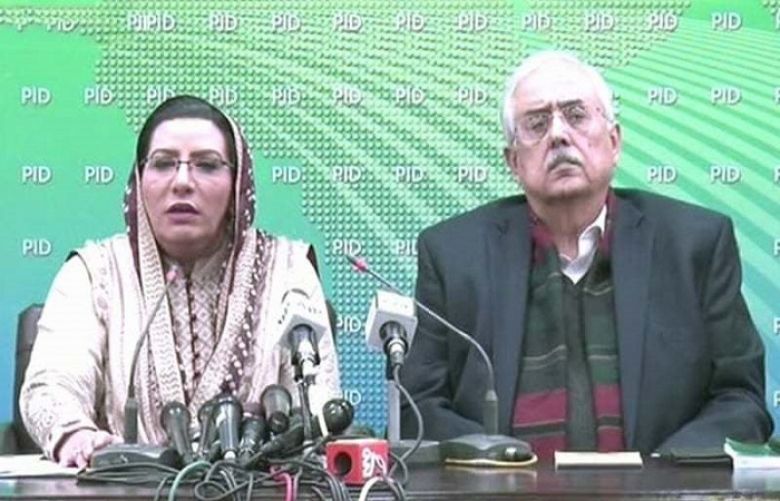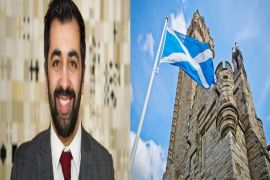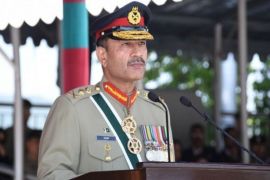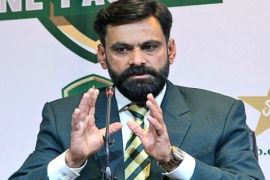Attorney General of Pakistan Anwar Mansoor Khan said the high treason case against former president retired Gen Pervez Musharraf was "void from the beginning" and questioned "what the rush was" in pronouncing the judgment — the death penalty — which was given in absentia.
AG Khan's remarks came during a press conference held in Islamabad late Tuesday night alongside the government's chief spokesperson Firdous Ashiq Awan.
A special court had earlier in the day sentenced the former military ruler to death.
"A trial in absentia is not a routine matter," he said.
"[Musharraf] was not given a chance to record his statement under Section 342 (of the Constitution), to present his testimony and witnesses.
"Every person is guaranteed a fair trial under Article 10-A of the Constitution," said the attorney general.
"A trial should not just be fair but must also be seen to be fair," he added.
'Legal aspects'
Before commenting on the matter, the attorney general had warned that it must be considered that he is not speaking in favour of a particular individual or supporting anyone. "I am only going to speak of the legal aspects of the case."
AG Khan, providing a brief backdrop of the circumstances that led to today's verdict, said that the case was launched on the Supreme Court's directions, under Article 6 of the Consitution which pertains to high treason.
"A special court was then formed and then a complainant — who was an interior secretary — filed a complaint that Musharraf had violated the Constitution and that the matter falls within Article 6, therefore a high treason case must be made against him."
He recalled that Musharraf was in Pakistan when the charges against him were announced and had filed some petitions requesting that others involved in the decision to impose an emergency also be made a party to the case.
AG Khan said that following the 18th Amendment, in which Article 90 was modified, the president was no longer given the authority by the federal government to file a complaint.
"Because he could not file a complaint, the action taken against Musharraf was void from the beginning and could not have been carried out lawfully."
"Musharraf is bed-ridden and is in the ICU at a hospital. So this is another major issue: when you know a person is hospitalised, in his absence was it right to announce this judgment or not?" he said, as he continued to explore the legality of the verdict.
He said that the government wished to change its team at one point in the case, so that "mistakes made by the past governments" can be rectified.
"[The previous] team was not ready to make those changes."
He said when the team was swapped out, the court reacted very strongly and issued immediate directives to get the case moving, "irrespective of the situation".
The last team had filed "written arguments" after its removal and the court thought that to be true and based their decision on those arguments.
"When the case was fixed, the additional attorney general — who by law is also the prosecutor — was sent by me to argue the case, but the court sat him down saying, 'You have not been appointed by the federal government' whereas an additional attorney general is an appointed officer under the law."
"Despite that, the court refused to listen to him and said a new team of senior lawyers must be formed," said AG Khan.
He said the new team had requested the court for some time to study the case as they had just been appointed but "the court refused and told them to argue or the verdict will be announced".
Expanding on what constitutes a fair trial, AG Khan said that the court was requested to allow that the accused's statement be recorded. "The court said you must bring him to Pakistan or else we will not record a statement."
The attorney general then said entire hearings had been held via video link and said many people had recorded their statements from abroad in various cases in the past.
"When it came to [Musharraf] and when the court was told he is unable to travel, the court refused the request," he said, adding that a request for a commission to be formed to go collect the statement was also rejected by the court.
"When the lawyers wished to record evidence, that too was refused. When Chaudhry Shujaat expressed willingness to be made a party to the case, that, again, was refused."
AG Khan said various applications were also submitted requesting that various generals and bureaucrats be made party to the case, but they, too, were rejected by the court.
"Whenever a conspiracy is hatched, it is an action undertaken by multiple people. And if this was a conspiracy, it could only be proved in the presence of the others.
"If they were not present this means it was a directed, personal attack or action against one person."
He said this government has the viewpoint where it believes every person, no matter what wrongdoing they have committed, must be provided justice.
"The government will stand up against injustice when it sees an accused is not provided justice. Injustice is a curse for the country."







